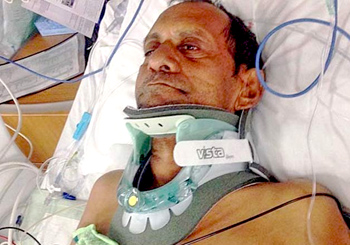Washington, Feb 13: One of the two police officers who allegedly assaulted the 57-year-old Indian man in Alabama has been arrested and FBI will be conducting a probe into the matter to find out if there were any federal violations in the incident.

"I sincerely apologise to Mr Patel, Mr Patel's family and our community. We strive to exceed expectations," Muncey told reporters at a news conference.
"Additionally FBI would be conducting a parallel inquiry to ascertain if there were any federal violations," Muncey said after he released audio and videos related to the incident.
"As a result of the investigations, I found that Mr Parkers's actions did not meet the high standard and expectations of the Madison City Police Department," he said, adding, that he (Muncey) has proposed termination of officer Parker, who has now been arrested for third-degree assault.
The incident occurred on the morning of February 6 while walking down the sidewalk in the neighbourhood, Patel, a permanent US resident, "was violently assaulted by a police official without provocation, and left partially paralysed," according to the 11-page lawsuit filed.
A day before, Patel had arrived in the United States to assist his son and daughter-in-law in caring for their 17-month-old child, who was developmentally delayed after a premature birth.
In the video, Patel is seen walking quietly in a sidewalk. He is not seen peeping at any of the houses or garage as was the police told in an non-emergency call it received from a neighbour, after which a police car was rushed to the neighbourhood.
In the video, two police officers are see approaching Patel and asking him questions – like name, address and identity card.
Patel is heard saying "No English" and pointing figure towards his son's home. Soon one of the police officer, later identified as Parker, is seen violently throwing Patel on the ground and threatening him not to leave. It is at this time it appears Patel was paralysed, apparently by shock.
Moments later when two police officers try to walk him, Patel is not able to stand on his own. Patel was severely injured in the incident, said his attorney Henry F Sherrod.
Patel has been partly paralysed and is currently under treatment at a city hospital.
The incident was condemned by Indian community members across the globe.
In the Meanwhile, an online fundraising campaign has started to help the Patel family with their mounting medical bills.
By yesterday evening nearly USD 12,000 was raised out of the target of USD 12,000. The amount was raised by 278 people in one single day.
The funds raised will be provided directly to the family to help cover medical bills and other fees related to this incident.
Angered by the incident, SAALT (South Asian Americans Living Together) in a statement demanded immediate disciplinary action and termination of the officials concerned.
It asked Madison Police to investigate with expediency and thoroughness the reasons that led to the police encounter with Patel, what occurred during the incident, and the subsequent steps taken by the police department, including a timeline to publicly release the investigation's findings.
New York-based Indian American attorney Ravi Batra said the local Madison cop dishonored his badge, and violated Sureshbhai Patel's federal civil rights and state rights.
"The governor of Alabama needs to speak out and mayor of Madison need to retrain their cops while holding Police Chief Larry Muncey responsible," he said.
"Our federal government, led by President Obama, can move Sureshbhai to Walter Reade hospital - where US presidents go for care, and give him the best medical care to repair his spinal injuries," Batra said in a statement.





Comments
Add new comment